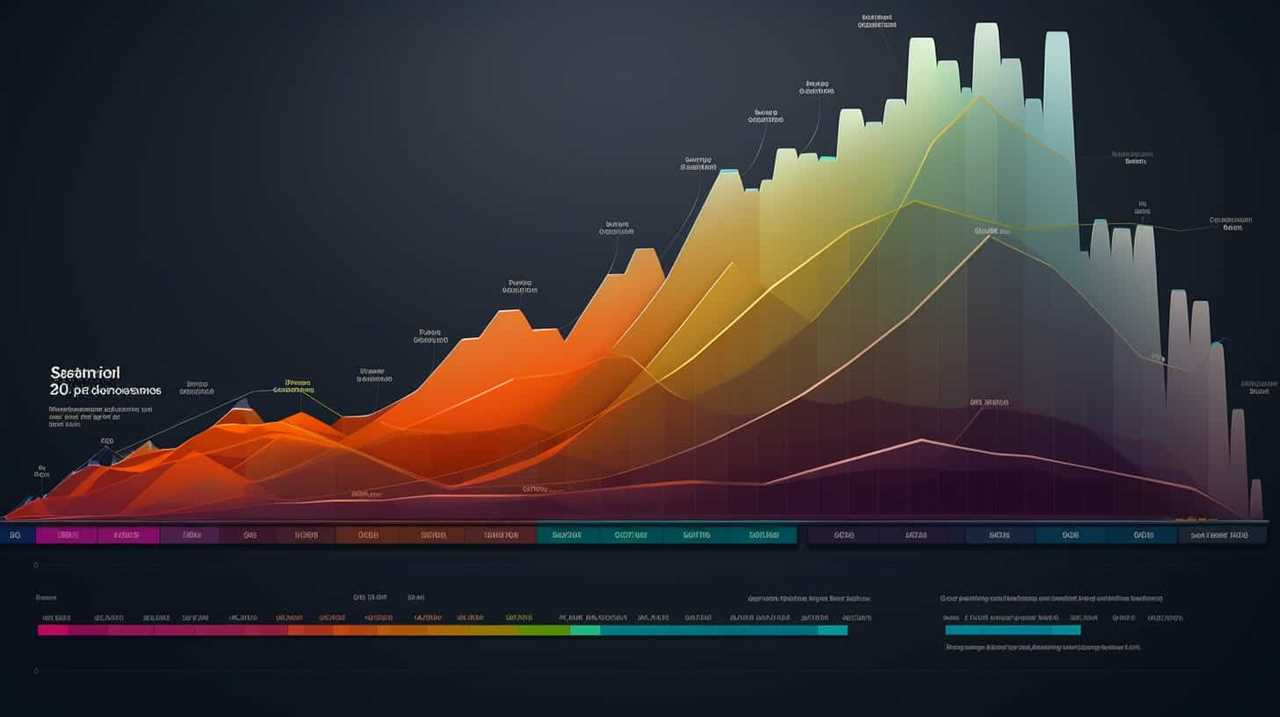Do you wonder if Webflow is effective at SEO? Let’s dive into this subject!
In this article, we’ll explore Webflow’s SEO features and how they stack up against other platforms.
We’ll also discuss the importance of on-page optimization and how Webflow’s built-in SEO tools can help maximize your site’s potential.
So, if you’re looking to master the art of SEO on Webflow, you’ve come to the right place! Let’s get started.

Key Takeaways
- Webflow offers clean and SEO-friendly code generation.
- Webflow provides customizable meta tags for each page, including title tags and meta descriptions.
- Webflow seamlessly integrates with popular SEO tools like Google Analytics and Google Search Console.
- Webflow’s built-in SEO tools help optimize websites for better visibility and higher rankings on search engine results pages.
Webflow’s SEO Features
Webflow offers a variety of SEO features to improve website visibility and search engine rankings. These features provide several benefits for users looking to optimize their websites.
One of the main benefits of using Webflow for SEO is its ability to generate clean and SEO-friendly code. This ensures that search engines can easily crawl and index your website, leading to better rankings.
Additionally, Webflow’s built-in SEO settings allow you to optimize your meta tags, headings, and URLs, further enhancing your website’s visibility.
However, it’s important to note that Webflow does have some limitations when it comes to SEO. For example, the platform doesn’t offer advanced SEO features like schema markup or structured data.

Additionally, Webflow’s SEO options are limited compared to dedicated SEO tools.
Despite these limitations, Webflow’s SEO features can still be effective in improving website rankings and visibility.
Understanding Webflow’s SEO Capabilities
To fully understand Webflow’s SEO capabilities, let’s delve into its range of features and functionalities. Here are four key aspects to consider when optimizing Webflow websites for search engines:
- Customizable meta tags: Webflow allows users to easily add and edit meta tags for each page, including title tags and meta descriptions. This helps improve the visibility and click-through rates of webpages in search results.
- Clean HTML structure: Webflow generates clean and semantic HTML code, ensuring that search engines can easily crawl and index the website’s content. This contributes to better search engine rankings.
- Responsive design: Webflow’s responsive design capabilities enable websites to be mobile-friendly, which is crucial for SEO as Google prioritizes mobile-friendly websites in search results.
- Integration with third-party SEO tools: Webflow seamlessly integrates with popular SEO tools like Google Analytics and Google Search Console, allowing users to track website performance and make data-driven optimizations.
While Webflow offers powerful SEO features, it’s important to note its limitations. For instance, the platform lacks advanced SEO functionalities like schema markup customization and automatic XML sitemap generation. However, with careful optimization and leveraging Webflow’s capabilities, websites built on the platform can still achieve strong SEO performance.

Evaluating Webflow’s Impact on Rankings
We can assess the impact of Webflow on rankings by analyzing its performance in search engine results. Evaluating rankings is crucial for maximizing the potential of a website and ensuring its visibility to the target audience. To better understand the impact of Webflow on search engine rankings, let’s take a look at the following table:
| Ranking Factors | Webflow Performance |
|---|---|
| Page Speed | Excellent |
| Mobile Optimization | Good |
| On-Page SEO | Solid |
Webflow excels in page speed, which is a crucial ranking factor. It ensures that websites built on the platform load quickly, providing a positive user experience. Moreover, Webflow offers good mobile optimization, which is important considering the increasing number of mobile users. Lastly, Webflow’s on-page SEO capabilities are solid, allowing website owners to optimize title tags, meta descriptions, and other elements for better search engine visibility. By evaluating these rankings factors, we can conclude that Webflow has a positive impact on search engine rankings and can help websites maximize their potential.
The Importance of On-Page Optimization in Webflow
When it comes to optimizing our website for search engines, on-page SEO techniques play a crucial role. In Webflow, understanding and implementing these techniques can greatly improve our website’s visibility and rankings.
On-Page SEO Techniques
In terms of achieving good SEO in Webflow, it’s crucial to prioritize on-page optimization techniques. Effective on-page optimization strategies play a significant role in improving SEO performance and website rankings.

Here are four essential on-page SEO techniques to consider:
- Keyword Optimization: Conduct thorough keyword research and strategically incorporate relevant keywords into your website content, meta tags, headings, and URLs.
- Content Quality: Create high-quality, valuable, and original content that’s relevant to your target audience and optimized for search engines.
- Meta Tags: Optimize your meta titles and descriptions with relevant keywords to improve click-through rates and search engine visibility.
- URL Structure: Use descriptive and keyword-rich URLs that provide clear information about the content of your web pages.
Implementing these on-page SEO techniques will enhance your website’s visibility, organic traffic, and overall SEO performance in Webflow.
Webflow SEO Features?
Continuing the discussion on on-page SEO techniques, let’s explore the Webflow SEO features and the importance of on-page optimization in Webflow.
When it comes to optimizing Webflow websites, the platform offers a range of built-in SEO tools to help improve your website’s visibility on search engines. One of the key features is the ability to customize meta tags, titles, and descriptions for each page, allowing you to optimize your content for relevant keywords.

Webflow also provides options for adding alt text to images, which is crucial for improving accessibility and search engine rankings. Additionally, the platform automatically generates clean and semantic HTML code, making it easier for search engine crawlers to index and understand your website’s content.
Webflow Vs. Other Seo-Friendly Platforms
One major advantage of Webflow over other SEO-friendly platforms is its intuitive user interface. With Webflow, you don’t need to have extensive coding knowledge to create and manage your website’s SEO.
Here are four key points to consider when comparing Webflow to other platforms:
- Webflow vs. WordPress for SEO: While WordPress offers a wide range of SEO plugins, Webflow has built-in SEO features that are seamlessly integrated into its platform. This means you have more control over your website’s SEO without relying on third-party plugins.
- Webflow vs. Shopify for SEO: Shopify is primarily an e-commerce platform, whereas Webflow is a comprehensive website design tool. With Webflow, you have more flexibility to optimize your website’s SEO beyond just product pages, making it a better choice for businesses looking to enhance their overall online presence.
- Advanced SEO capabilities: Webflow provides advanced SEO capabilities, including custom meta tags, XML sitemaps, and clean URL structures. These features allow you to optimize your website for search engines and improve your organic search rankings.
- Code optimization: Webflow generates clean, semantic code, which is essential for SEO. Having streamlined code ensures that search engine crawlers can easily understand and index your website’s content, leading to better visibility in search results.
Webflow’s Compatibility With SEO Best Practices
When it comes to Webflow’s compatibility with SEO best practices, there are a number of features that make it a solid choice for optimizing your website.

Webflow offers built-in SEO tools and allows for easy customization of meta tags, URLs, and alt text.
Additionally, compared to traditional CMS platforms, Webflow provides a more streamlined and efficient process for implementing SEO strategies.
Seo-Friendly Webflow Features
Webflow’s SEO-friendly features ensure compatibility with best practices, enabling us to optimize our website for search engine visibility.
Here are some of the key features that make Webflow a great choice for SEO:

- Clean and semantic HTML: Webflow generates clean and structured HTML code, making it easier for search engines to understand and index our website.
- Customizable meta tags: We’ve full control over our meta tags, including titles, descriptions, and keywords, allowing us to optimize them for better search engine rankings.
- Image optimization: Webflow automatically compresses and optimizes images, reducing their file size without sacrificing quality. This helps improve page loading speed, which is a crucial factor for SEO.
- Responsive design: Webflow’s responsive design capabilities ensure that our website looks great on any device, meeting the mobile-friendly criteria that search engines prioritize.
With these optimization techniques, Webflow empowers us to create SEO-friendly websites that can positively impact our search engine rankings.
Webflow Vs. Traditional CMS
Webflow’s compatibility with SEO best practices sets it apart from traditional CMS platforms in terms of optimizing website visibility for search engines. When comparing Webflow vs. WordPress, Webflow offers a more streamlined and intuitive approach to implementing SEO optimization techniques.
Unlike WordPress, which often requires the use of plugins and additional coding, Webflow provides built-in SEO features that make it easier to optimize your website for search engines. These features include customizable meta tags, clean HTML markup, automatic sitemaps, and responsive design, all of which contribute to better search engine rankings.
By utilizing Webflow’s SEO optimization techniques, website owners can ensure that their content is easily discoverable by search engines, leading to increased organic traffic and improved online visibility.

Now, let’s delve into how you can leverage Webflow’s built-in SEO tools to further enhance your website’s SEO performance.
Leveraging Webflow’s Built-in SEO Tools
To maximize our website’s search engine optimization, we can utilize Webflow’s robust set of built-in SEO tools. These tools provide a range of features that help optimize Webflow websites for better visibility and higher rankings on search engine results pages.
Here are four key ways we can leverage Webflow’s built-in SEO tools:
- SEO meta tags: Webflow allows us to easily add and customize meta tags, such as title tags and meta descriptions, to optimize our website’s visibility in search results.
- SEO-friendly URLs: Webflow automatically generates clean and readable URLs for our website pages, which is essential for effective SEO.
- Image optimization: With Webflow, we can optimize our website’s images by adding alt text, file names, and captions, helping search engines understand the content of our images.
- XML sitemaps: Webflow generates XML sitemaps automatically, making it easy for search engines to crawl and index our website.
Webflow’s Performance in Search Engine Results
Analyzing Webflow’s performance in search engine results reveals its effectiveness in driving organic traffic and improving website visibility. With its advanced SEO capabilities, Webflow has a significant impact on organic search rankings. By optimizing key elements such as meta tags, headings, and alt text, Webflow ensures that websites built on its platform are easily discoverable by search engines. Additionally, Webflow’s clean and efficient code structure contributes to faster page load times, which is a crucial factor in search engine rankings. A well-optimized website, combined with Webflow’s responsive design and mobile-friendly features, enhances user experience and increases the chances of higher rankings in search results. The table below highlights some key SEO features offered by Webflow:

| SEO Feature | Description |
|---|---|
| Meta tags | Customizable meta titles and descriptions to improve search engine visibility. |
| Heading structure | Properly structured headings to provide context and improve keyword relevance. |
| Alt text | Ability to add alt text to images for improved accessibility and better image search rankings. |
| Clean code | Webflow generates clean HTML and CSS code, resulting in faster page load times. |
Maximizing Webflow’s SEO Potential
We can maximize Webflow’s SEO potential by implementing effective strategies and utilizing its advanced features. Here are some key ways to optimize Webflow for search engines and increase its visibility:
- Conduct thorough keyword research to identify relevant and high-ranking keywords for your website.
- Optimize your website’s meta tags, including the title tag, meta description, and alt tags for images, to improve search engine visibility.
- Create high-quality and engaging content that incorporates target keywords naturally.
- Utilize Webflow’s built-in SEO tools, such as the SEO panel and the ability to create SEO-friendly URLs, to enhance your website’s search engine optimization.
Frequently Asked Questions
How Long Does It Take for Webflow’s SEO Features to Start Showing Results?
When it comes to Webflow’s SEO features, we often wonder how long it takes to see results. Are they worth the investment? Well, let’s explore the timeframe for their effectiveness and evaluate their value.
Can Webflow Automatically Generate Meta Tags and Descriptions for My Website?
Yes, Webflow can automatically generate meta tags and descriptions for your website. This automated SEO optimization feature saves time and offers the benefits of custom meta tags, improving your website’s search engine visibility.
Does Webflow Offer Any Tools to Analyze Keyword Rankings?
Webflow offers keyword analysis tools to track and analyze keyword rankings. The timeframe for seeing SEO results will vary depending on various factors such as website content and competition.

Can I Integrate Third-Party SEO Tools With My Webflow Website?
Yes, we can integrate third-party SEO tools with our Webflow website. By integrating Google Analytics, we can track website traffic and user behavior. We can also optimize image alt tags for better SEO performance.
How Does Webflow Handle Mobile Optimization for SEO Purposes?
When it comes to mobile optimization for SEO, Webflow excels. With a mobile-first indexing approach and adherence to best practices for mobile SEO, Webflow ensures that your website ranks high in search results and reaches a wider audience.
Conclusion
In conclusion, Webflow offers robust SEO features that can greatly enhance a website’s visibility and rankings in search engine results. It provides compatibility with SEO best practices and offers built-in tools to optimize on-page elements.
While Webflow may not guarantee instant success, leveraging its capabilities and maximizing its SEO potential can lead to a fruitful online presence.

Like a well-tuned instrument, Webflow can help websites hit all the right notes in the search engine symphony.









